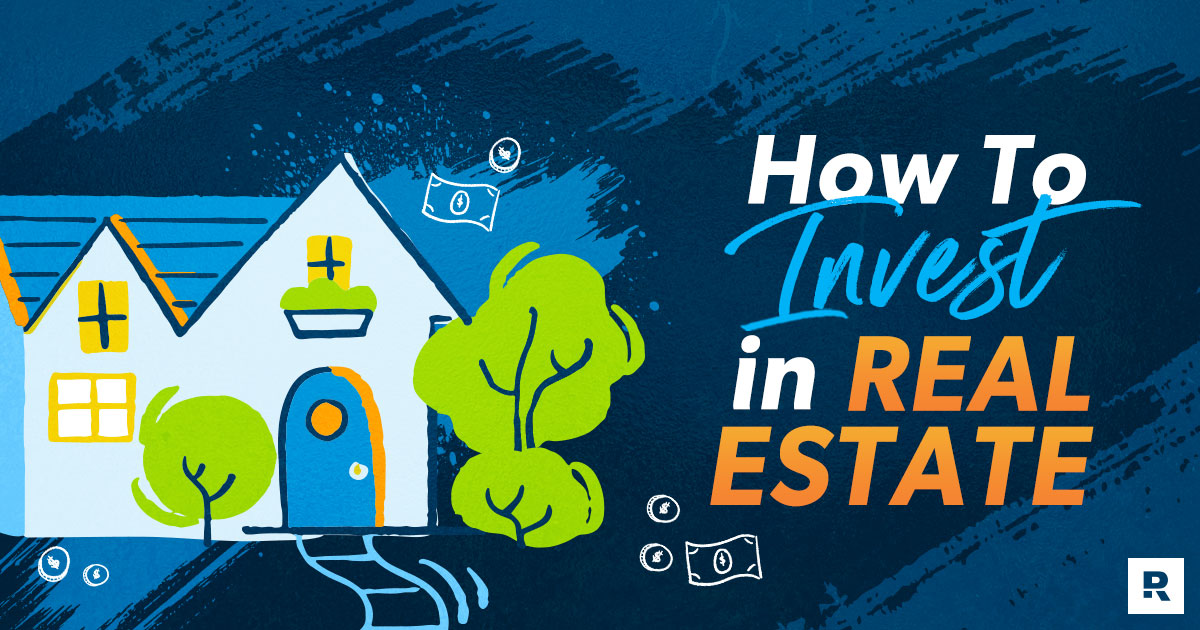
Key Takeaways
- The best way to start investing in real estate is to become a homeowner and pay off the mortgage on your personal residence.
- Buying a rental property and flipping houses can be great ways to earn extra income, but there’s risk and a lot of work involved.
- Don’t make real estate investments beyond your primary residence unless you’re completely debt-free and you can pay cash.
Have you scrolled through TikTok, Instagram or YouTube lately? If so, chances are you’ve seen someone talking about how investing in real estate can be a game changer for your money. Well, they’re right! A solid real estate investment strategy can absolutely boost your net worth and help you earn a big chunk of extra income.
But here’s what a lot of those online “experts” don’t tell you: Investing in real estate usually takes a ton of work. It’s not as simple as sitting back in your recliner and collecting a check every month. Whether you’re buying a rental property, flipping houses, or simply working hard to pay off the home you live in, real estate investments take a lot of time, money and effort.
Investing in real estate isn’t a bad idea at all. In fact, we’re huge fans of it. But you need to be patient and willing to put in the work. It’s not “passive” income, and it’s definitely not going to make you wealthy overnight.
So, if you’re up for all that and you still want to learn about real estate investing, great! We’ll break down how to do it the right way and answer some key questions, like “How do you get started in real estate investing?” and “Is real estate a good investment?”
How to Invest in Real Estate: 4 Ways
Real estate investing comes in different shapes and sizes. So if you want to know how to invest in real estate, here are four main ways to do it.
1. Buy a home (and pay it off fast!).
You may not think of it this way, but buying your own home (you know, the one you live in) and paying it off is an investment in and of itself. Personal homeownership forces you to save money as you pay off your mortgage and build equity. And it boosts your net worth since the value of your home will likely keep going up as long as you own it.
And here’s the best part: Once you pay off your home and kiss your mortgage goodbye, you won’t ever have to worry about losing it (as long as you pay taxes and insurance, of course). You can stay calm regardless of the ups and downs of the real estate market.
Plus, when you don’t have a mortgage, you have a lot more money to put toward other investments, like your 401(k) or Roth IRA. Imagine how much wealth you could build by investing a house payment every month! That’s why paying off your personal home is the first step to investing in real estate—and something you should do before investing in any other properties.
If you’re currently renting and want to become a homeowner for the first time, start by paying off all your debt and saving up an emergency fund of 3–6 months of your typical expenses. Then, save up enough cash to make a down payment of at least 5–10% (or 20% if you want to avoid paying for private mortgage insurance).
You’ll also want to make sure your payment on a 15-year fixed-rate mortgage (the only type of mortgage you should use) isn’t more than 25% of your take-home pay—that way, you’ll have plenty of margin in your budget.
2. Purchase a rental property.
Once you’ve paid off your personal home (along with any other debt), purchasing a rental property can be a great way to bring in extra cash—potentially adding thousands to your yearly income. And if you decide to sell down the road, you could earn a nice profit if you take good care of the property and its value goes up.
But here’s the deal: You should only buy a rental property if you have a full emergency fund (remember, that’s 3–6 months of your typical expenses) and you can pay for the property with cash. Taking out a mortgage for your personal residence is one thing, but going into debt for an investment property is way too risky.
That’s because, while rental properties can be a great source of extra income, they can also be a major pain in the neck from time to time. Owning a rental property means dealing with renters, and sometimes renters don’t actually pay their rent. Sometimes they break stuff. Sometimes you won’t even be able to find a tenant in the first place.
As a landlord, you’ll be on the hook for all those risks and the expenses that come with them—like repair costs and insurance. And then there’s the time cost. When the toilet busts at 2 a.m., guess who’s coming to the rescue? That’s you. (This ain’t “passive” income, folks.)
When you pay cash for a rental property, you can afford to take on those risks—and you may wind up with a legitimate cash cow that’ll last for years. But when you use debt to invest in real estate and have to worry about making payments every month, a missed payment from a renter or a big repair could send your personal finances into a tailspin.
And just so we’re clear: Any real estate investing you do beyond your primary residence should be in addition to putting 15% of your income toward tax-advantaged retirement accounts like a 401(k) or a Roth IRA.
3. Flip a house.
If becoming a landlord isn’t for you, another way to invest in real estate once you’ve paid off your primary residence is flipping a house. That means you buy a house, make improvements, then sell it—all within a fairly short amount of time. The key is to buy low because in most cases, you can’t expect to make a decent profit unless you’re really getting a great deal on the front end.
House flipping is appealing because it’s quicker than renting out a property for years. In a matter of months, you could get the house back on the market and (hopefully) turn a nice profit.
But just like other investments, there’s a risk of losing money—especially if the market changes or the house turns out to be a dud. Plus, flipping houses isn’t as glamorous as TV shows make it seem. If you love hands-on work (and actually know what you’re doing), then have at it! If you don’t, you’d better hire a contractor.
That’s why, just like with buying a rental, you should get into house flipping only if you have a full emergency fund and you can pay cash for the properties. When you take debt out of the equation, the risks involved with house flipping aren’t nearly as big of a deal. You’ll also want to budget plenty of time and money for any repairs or upgrades you’re planning to make. Renovations almost always cost more (and take longer) than you think they will, and you’ll want to pay cash for them too.
Before you jump into house flipping, talk to a real estate agent about the potential to successfully flip houses in your area. They’ll help you figure out how to get into real estate investing based on your local market.
4. Invest in a REIT.
There’s one other way to invest in real estate that we need to go over: investing in a real estate investment trust (REIT). This one’s a little tricky, so hold on tight for a second.
A REIT (pronounced “reet”) is basically a mutual fund where, instead of buying stocks, the fund manager buys real estate and passes the profits on to you. While REITs used to be a horrible investment, they’ve come a long way over the years. These days, plenty of REITs perform just as well as traditional mutual funds or index funds.
But before you go sign on the dotted line and enter the world of REITs, there are a few things you need to know. First, you should invest in REITs only if you’re completely debt-free (including your house) and you’ve already maxed out your tax-advantaged retirement accounts—like your 401(k) and Roth IRA.
Second, while REITs have improved significantly across the board, some individual REITs are still terrible investments. So if you’re going to invest in a REIT, choose a fund with a long track record of strong returns that’s run by a group of investors who know what they’re doing.
Finally, don’t let your REIT investments exceed 10% of your net worth. If you can check all these boxes, then a REIT could be a great way for you to invest in real estate without the potential headaches of house flipping or owning a rental property.
Invest Like No One Else
From investing advice to wealth management, find a SmartVestor Pro who speaks your language.
Ramsey Solutions is a paid, non-client promoter of participating pros.
Pros and Cons of Real Estate Investing
Now that you know how to invest in real estate, let’s look at some of the pros and cons of real estate investing.
Pros
- You get an additional income stream. Duh! This is the primary reason that investing in real estate can be such a good idea if it makes sense for you financially. (Of course, this one only applies to rental properties and house flipping.)
- Your net worth will increase. Investing in real estate will boost your net worth, which will continue to grow as the value of your property goes up.
- You can qualify for tax advantages. Real estate investors who itemize their taxes can take advantage of some deductions. While getting a tax break isn’t the reason you should make a real estate investment, it’s a nice perk.
Cons
- It usually takes a lot of work. Like we talked about earlier, the idea that becoming a landlord or flipping houses is a way to earn money with minimal effort is just plain wrong. There’s almost always a ton of time and energy involved.
- There are risks. As with any type of investment, real estate investing isn’t risk free. Luckily, you can limit your risk—just be sure to pay cash for investments beyond your personal residence and have an emergency fund at the ready.
- You aren’t guaranteed to make money. While investing in real estate can be a great way to earn extra income and increase your net worth, it’s not a guarantee—especially if home values in your area don’t go up as much as you expect or you can’t find a tenant to fill a rental property.
Tips for Investing in Real Estate
Wondering about the best strategies for real estate investing—rental properties and house flipping especially? Here are five of our favorite tips.
Pay cash.
As we’ve already gone over, taking debt out of the equation lowers your risk. Can’t find a tenant for your rental property? Without a mortgage, you don’t need renters right away. Housing market took a nose dive right when you wanted to sell the house you flipped? You can afford to wait for the market to recover when you don’t have payments. Paying cash also sets you up to make money sooner. Instead of repaying a lender, you get to keep all the profits.
Keep a strong emergency fund.
Renting out property usually isn’t as simple as getting renters and checking in once a year. Sometimes rentals sit empty for months, which can be tough if you’re not financially prepared. And even in the best situations, appliances still break and roofs still leak. So make sure you have a strong emergency fund for your real estate investments.
Start small.
Not sure if real estate investing is for you? Test it. Maybe you can rent out a space above your garage or an extra bedroom—even for a few nights at a time. That’ll give you a taste of what owning a rental is like. It’s also wise to talk to other real estate investors. Get lunch with them and ask them what they wish they’d known before getting started.
Stay local.
Don’t buy an investment property in Arizona if you live in Illinois! When you live far away from your properties, you’re forced to blindly trust a management company to handle your business—and that makes it much harder to hold them accountable. So stay close and keep tabs on your investments.
Hire a real estate agent.
We can’t stress this enough: You need a local real estate agent. They’ll know what areas you should look into and what hurdles you might face as a real estate investor. And when it’s time to buy a property, they can help you get a better deal than you’d get on your own.
Is Real Estate Investing for You?
Real estate investing isn’t for everyone. But if you’re willing to put in the work and you have enough patience to move at the speed of cash, it can be a huge blessing.
Just make sure you don’t invest in anything you don’t understand, and only do what you’re comfortable with—your investments shouldn’t stress you out! You’ve got this.
Next Steps
- If you’re ready to start investing in real estate, decide what options you’re most comfortable with and do some extra research.
- Before you start looking at properties, get connected with a RamseyTrusted® real estate agent who can help you understand your local housing market and show you the best options for your situation.
- A financial advisor can help you decide how real estate can fit into your overall investment strategy. You can find an investing pro through our SmartVestor program.
Frequently Asked Questions
This article provides general guidelines about investing topics. Your situation may be unique. To discuss a plan for your situation, connect with a SmartVestor Pro. Ramsey Solutions is a paid, non-client promoter of participating Pros.
-
When should you start investing in real estate?
-
You should begin investing in real estate beyond your personal home once you’re completely debt-free (including your mortgage) and already investing 15% of your income into tax-advantaged retirement accounts, like a 401(k) or Roth IRA.
-
How do I start investing in real property?
-
The best way to start investing in real property is to become a homeowner. Make a strong down payment, pay off your house as quickly as possible, and then you can continue investing in real estate by purchasing a rental property, flipping houses, or investing in REITs. Just make sure you do all your investing beyond your personal residence with cash, because going into debt for investments is a big risk.
-
Is $5,000 enough to invest in real estate?
-
No. You should invest in real estate beyond your personal residence only if you can pay cash for the property, and $5,000 just isn’t going to get you there.
-
Is investing in real estate good for beginners?
-
No. You shouldn’t invest in real estate unless you have a good understanding of what you’re doing. And you definitely want to be debt-free, including your personal home, before you purchase a rental property or try to flip a house.




